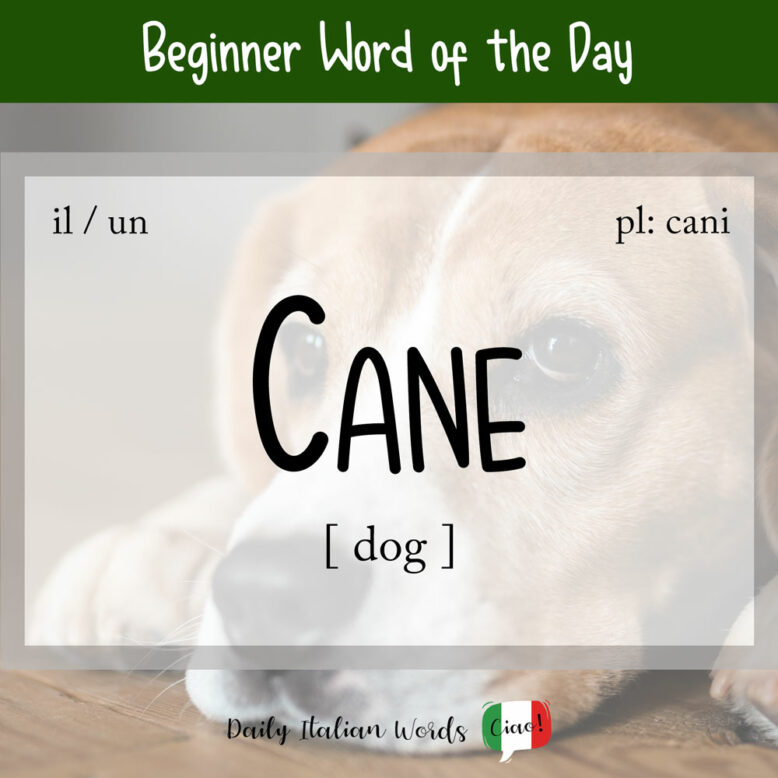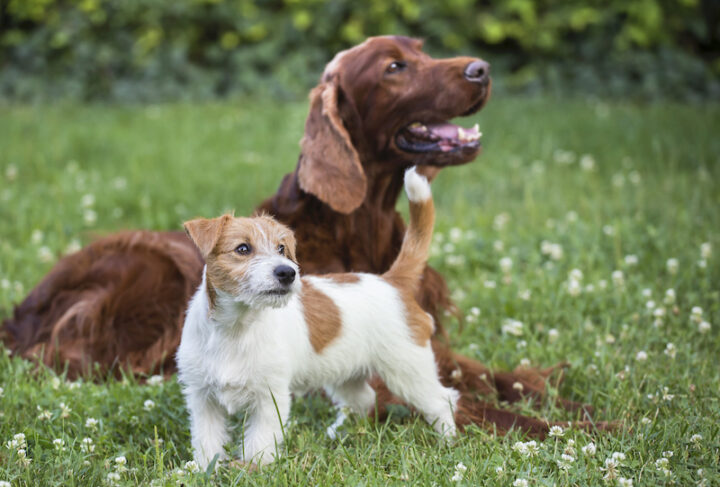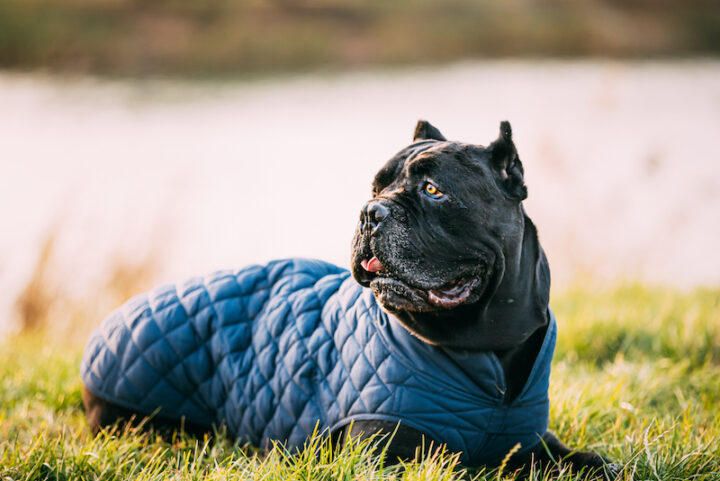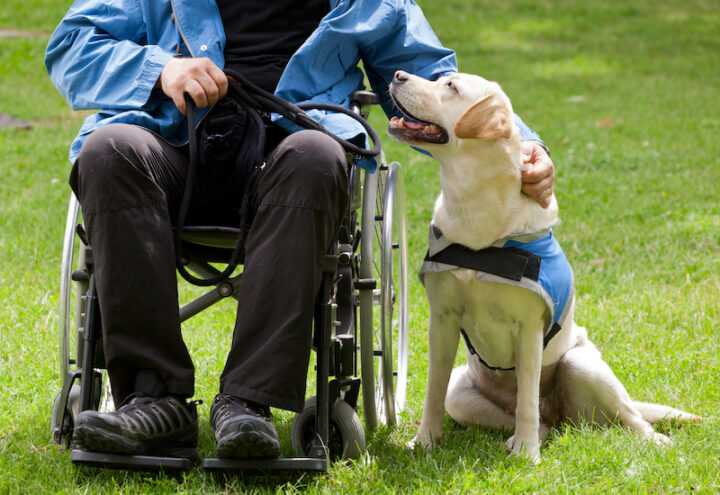Today’s post is all about man’s best friend! The word for dog in Italian is cane (plural: cani), which is easy to remember as it sounds similar to the word canine. It comes from the Latin canis meaning dog.
cane
dog

The feminine of cane is cagna (bitch). In addition to referring to a bad or nasty woman just as in English, it can also be a pejorative term for an actress or a singer with little talent.
When talking about a puppy, Italians generally use the diminutive cagnolino or the generic word cucciolo (cub) instead of cane. Small dogs may also be referred to as cagnolino but cane piccolo is also common. A big dog, on the other hand, is called a cagnone or cane grosso.

Some of the most popular Italian dog breeds (razze di cane italiane) include:
- Bolognese = a small breed of dog of the bichon type whose name refers to the city of Bologna
- Bracco Italiano = a versatile gun dog
- Cane Corso = a large dog breed used for personal protection, tracking and law enforcement
- Cane da Pastore Bergamasco = originally used as a herding dog in the Alps near Bergamo
- Cane da Pastore Maremmano-Abruzzese = a breed of livestock guardian dog
- Cirneco dell’Etna = a small breed of dog from Sicily
- Lagotto Romagnolo = a gundog that is also used to hunt for truffles
- Maltese = a breed of dog in the toy group
- Mastino Napoletano = a breed of large guard dog from central Italy
- Piccolo Levriero Italiano = the smallest sighthound
- Segugio dell’Appennino = a small scenthound specifically bred to hunt hares
- Segugio Italiano a Pelo Forte / Raso = two breeds of dog from the scenthound family
- Segugio Maremmano = widely used for hunting wild boar in Tuscany
- Spinone Italiano = a versatile gun dog
- Volpino Italiano = a spitz-type breed of dog
While dogs are often classified into breeds, it is just as common for them to be classified by their function in human society. Common dog types according to function include: cane domestico (domestic / pet dog), cane da caccia (hunting dog), cane da guardia (guard dog), cane da pastore (sheep dog or herding dog), cane di razza (purebred), cane guida (guide dog), cane della polizia (police dog) and cane da corsa (racing dog).

Mi piacerebbe adottare un cane nero.
I would like to adopt a black dog.
According to this list, the most popular Italian dog names (nomi per i cani) in Italy in 2019 were Jack, Lucky, Leo, Oliver and Ettore for male dogs and Mia, Luna, Maya, Kira and Zoe for female dogs.
Figurative uses of ‘cane’
Cane can also be used to describe a person who is bad, cruel or incapable. It is from this figurative meaning that we get the insulting curse Figlio di un cane! (Son of a dog!). Two others curses you might hear are Mondo cane! (Dog world!) and Porco cane! (Dog pork!) but be cautious when using them as they can be quite offensive.
The notion of dogs as uncivilised beasts forms the basis of many Italian expressions that describe poor or miserable situations. A good example is the frequently used expression da cane / cani (of dog/dogs), which is another way of saying molto male (very bad) in Italian:
- una vita da cani = a hard, miserable life
- una sera da cani = a cold, miserable evening
- dormire da cani = to sleep poorly
- mangiare da cani = to eat poorly
- sentirsi da cani = to feel horrible, rotten
- un lavoro fatto alla cavolo di cane* = a poorly-done job
*Note: alla cavolo di cane literally translates as dog cabbage style. Cavolo is a mild swear word in Italian. Variations of the same phrase include alla cacchio di cane or alla cazzo di cane, where both cacchio and cazzo mean penis. The latter is considered vulgar so take care not to use it in polite company!
It may also function as a negative intensifier as in the case of the following examples:
- fare un freddo cane = to be extremely cold
- fare un male cane = to hurt a lot
- avere una paura cane = to be extremely scared
- avere un fame cane = to be starving
The good news for all the dog lovers out there is that cane, when used figuratively, doesn’t always have a negative connotation. For example, un cane grosso is an important person whereas un cane sciolto is a person who refuses to follow the norms of society. If someone is extremely loyal, you can say that he or she is fedele come un cane (as faithful as a dog).

Did you know that…?
Sirius (Sirio), the brightest star in the sky, is nicknamed la Stella del Cane (Dog Star) in both Italian and English because it is part of the constellation Canis Major (Cane Maggiore).
Expressions containing ‘cane’
Un cane che si morde la coda
Literal translation: a dog that bites its own tail
English meaning: to run in circles
Essere come cane e gatto
Literal translation: to be like a dog and cat
English meaning: to not get along
Fortunato come un cane in chiesa
Literal translation: as lucky as a dog in church
English meaning: to always be very unlucky
Sembrare un cane bastonato
Literal translation: to look like a beaten dog
English meaning: to look downcast, sad or shameful, like a dog beaten by its owner
Un cane che abbaia non morde
Literal translation: a dog that barks doesn’t bite
English meaning: someone who makes threats but does not act on them
Non c’è un cane
Literal translation: there isn’t a dog
English meaning: no one is here
Dog Commands in Italian
If you have just welcomed a puppy into your home, you may want to teach your new family member some basic commands (comandi) in Italian. (After all, what could be cuter than a bilingual pup!) Here are a few of the most common.
- Vieni qui! = Come here!
- A cuccia! = Down boy / girl! (lit: To the dog basket!)
- Terra! = Lie down! (lit: Ground!)
- Seduto! = Sit!
- Lascia! = Drop it! (lit: Leave!)
- Resta! = Stay!
- Fermo! = Stay!
- Piede! = Heel! (lit: Foot!)
- Qua la zampa! = Give me a paw! (lit: Here the paw!)
- Prendilo! = Fetch!
- Giù! = (Get) down!
- Su! = (Go) up!
- Bravo! / Brava! = Good boy! / Good girl!
- Andiamo! = Let’s go!
- No! = No!
- Basta! = Stop!
Heather Broster is a graduate with honours in linguistics from the University of Western Ontario. She is an aspiring polyglot, proficient in English and Italian, as well as Japanese, Welsh, and French to varying degrees of fluency. Originally from Toronto, Heather has resided in various countries, notably Italy for a period of six years. Her primary focus lies in the fields of language acquisition, education, and bilingual instruction.


